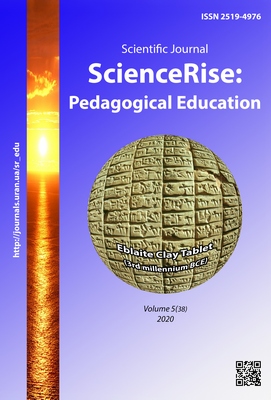Discovering significant peculiarities of pedagogical conflict: theoretical aspect
DOI:
https://doi.org/10.15587/2519-4984.2020.213243Keywords:
conflict, pedagogical conflict, conflict situations, typology of conflicts, conflictological competence, regulation of relationships.Abstract
The article deals with the generalization of the points of view of scientists on the essence of the notions “conflict”, ”pedagogical conflict” depending on their scientific approach for investigation. The integrative approach to the definition of these notions that unites into a single whole several other approaches (situational, personal, and motivational) was analyzed. Different approaches of scientists were examined as for the typology of conflicts. It has been estimated, that in the scope of pedagogy different classifications of conflicts are available where the content, importance, the sphere, duration of conflicts, direction, character of appearance, the structure of relationships, consequences, functions, socio-psychological effects, social results are taken into consideration. It is assumed, that the notion of pedagogical conflict includes different forms and methods of contradiction, tension in relations, explicit and hidden struggle. The functions of pedagogical conflicts in regulating interpersonal and intergroup relations were focused on (positive, negative); the reasons of pedagogical conflicts in high educational establishments (socio-economic, socio-psychological, psychological, organizational-pedagogical); the direction of the development of conflictological competence of a teacher (age and individual peculiarities of pupils, self-control of teacher’s behavior, the knowledge of pupils’ psychology and modern methods of teaching and upbringing of pupils).
References
- Soroka, I. A. (2015). Psykholohichna profilaktyka konfliktiv u pedahohichnomu kolektyvi vyshchoho navchalnoho zakladu. Kyiv, 256.
- Kozych, I. V. (2009). Formuvannia konfliktolohichnoi kompetentnosti starshoklasnykiv. Naukova skarbnytsia osvity Donechchyny, 1 (4), 66–69.
- Plakhotna, S. (2014). Konfliktolohichna kompetentnist yak zasib zasvoiennia pozytsii spivrobitnytstva u protsesi vzaiemodii «uchytel-uchni». Problemy pidhotovky suchasnoho vchytelia, 10 (3), 179–183.
- Aleksandrova, L. Iu., Munshi, A. Iu. (2009). K voprosu o konfliktologicheskoi kompetentnosti spetsialistov. Vestnik CHeboksarskogo kooperativnogo instituta, 1, 180–185.
- Thomas, K. W. (2002). Introduction to Conflict Management. CPP, 44. Available at: https://www.amazon.com/Introduction-conflict-management-Improving-performance/dp/B0006RZL4C
- Runde, C. E., Flangan, T. A. (2006). Becoming a Conflict Competent Leader: How You and Your Organization Can Manage Conflict Effectively. Jossey-Bass.
- Thomas, K. W., Kilmann, R. H. (1974). Thomas-Kilmann Conflict Mode Instrument. New York: Tuxedo, 16. Available at: https://www.worldcat.org/title/thomas-kilmann-conflict-mode-instrument/oclc/27376637
- Branitska, T. R. (2013). Formuvannia konfliktolohichnoi kultury maibutnikh fakhivtsiv sotsionomichnoi sfery v Rosii. Teoriia i praktyka upravlinnia sotsialnymy systemamy, 4, 24–30.
- Antonov, H. V. (2006). Pedahohichni zasady zapobihannia i rozviazannia konfliktiv u navchalno-vykhovnomu seredovyshchi vyshchoho navchalnoho zakladu. Kharkiv, 22.
- Trukhan, M. A. (2016). Formuvannia hotovnosti maibutnikh sotsialnykh pedahohiv do diialnosti z rozviazannia profesiinykh konfliktiv u zakladakh osvity. Khmelnytskyi, 266.
- Hlazkova, I. Ya. (2015). Stratehiia zapobihannia konfliktam subiektiv navchalnoho protsesu VNZ. Visnyk Dnipropetrovskoho un-tu imeni Alfreda Nobelia. Seriia: «Pedahohika i psykholohiia». Pedahohichni nauky, 1 (9), 210–215.
- Karmina, A. S. (Ed.) (1999). Konfliktologiia. Sankt-Peterburg: Izdatelstvo «Lan», 448.
- Bashkin, M. V. (2014). Konfliktnaia kompetentnost. Iaroslavl: IArGU, 72.
- Hirnyk, A. M. (2010). Osnovy konfliktolohii. Kyiv: Vydavnychyi dim «Kyievo-Mohylianska akademiia», 222.
- Volkova, N. P. (2006). Profesiino-pedahohichna komunikatsiia. Kyiv: VTs «Akademiia», 256.
- Golovanova, I. I. (2011). Metodika upravleniia konfliktami. Kazan: TSentr innovatsionnykh tekhnologii, 79.
- Krishbaum, E. I. (1986). Psikhologo-pedagogicheskii analiz konfliktnykh situatsii v pedagogicheskom protsesse. Leningrad, 252.
- Pidbutska, N. V. (2010). Osoblyvosti konfliktiv u navchalno-vykhovnomu protsesi vyshchykh navchalnykh zakladiv. Naukovyi visnyk MDU imeni V. O. Sukhomlynskoho. Seriia: Pedahohichni nauky, 1 (31), 143–150.
- Nikulina, I. V. (2016). Fenomenologiia pedagogicheskikh konfliktov. Vestnik Samarskogo un-ta. Serіia: Istoriia, pedagogika, filosofiia, 82–86.
- Podoliak, L. H., Yurchenko, V. I. (2006). Psykholohiia vyshchoi shkoly. Kyiv: TOV «Fil-studiia», 320.
- Bilenka, O. B., Chaikivskyi, T. V. (2013). Sotsialno-pedahohichni konflikty u vyshchomu navchalnomu zakladi – prychyny vynyknennia ta shliakhy rozviazannia. Naukovyi visnyk NLTU Ukrainy, 23 (12), 385–389.
- Dolinska, L. V., Matiash-Zaiats, L. P. (2010). Psikhologіia konflіktu. Kyiv: Karavela, 304.
- Borisova, E. S. (2017). Problema konfliktologicheskoi kompetentnosti v prostranstve obscheobrazovatelnoi organizatsii. Izvestiia Samarskogo nauchnogo tsentra Rossiiskoi akademii nauk. Seriia: Sotsialnye, gumanitarnye, mediko-biologicheskie nauki, 2 (19), 28–32.
Downloads
Published
How to Cite
Issue
Section
License
Copyright (c) 2020 Ganna Polishchuk

This work is licensed under a Creative Commons Attribution 4.0 International License.
Our journal abides by the Creative Commons CC BY copyright rights and permissions for open access journals.
Authors, who are published in this journal, agree to the following conditions:
1. The authors reserve the right to authorship of the work and pass the first publication right of this work to the journal under the terms of a Creative Commons CC BY, which allows others to freely distribute the published research with the obligatory reference to the authors of the original work and the first publication of the work in this journal.
2. The authors have the right to conclude separate supplement agreements that relate to non-exclusive work distribution in the form in which it has been published by the journal (for example, to upload the work to the online storage of the journal or publish it as part of a monograph), provided that the reference to the first publication of the work in this journal is included.







